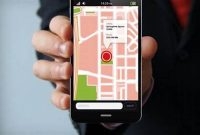Have you ever needed to find the location of someone you care about, such as a friend or family member? Or wanted to monitor an employee’s movements during the day? Whatever your reason, tracing someone’s phone can be a useful tool. However, the process can seem complicated and overwhelming. That’s why we’ve put together this comprehensive guide to help you trace someone’s phone. In this guide, we will cover everything, from the basics of tracking a phone’s location to more advanced techniques.

Understanding Phone Tracking
Mobile devices have become an important part of our daily routine, making it easier to connect with people across the globe. However, these devices can also be used to track locations and movements of people, which can raise privacy concerns. In this article, we will discuss phone tracking and how it works.
What is Phone Tracking?
Phone tracking is the process of collecting information on the location and movement of mobile devices. This can be done through different methods such as GPS, cell tower triangulation, and Wi-Fi positioning. The data collected can include the latitude and longitude coordinates of the device, the time of the location, and the speed of the device. This information can be used for various purposes such as location-based advertising, search and rescue operations, and criminal investigations.
GPS is the most accurate method of phone tracking. It uses a network of satellites to pinpoint the location of the device. This method requires the device to have a GPS chip and to be connected to a GPS signal. Cell tower triangulation, on the other hand, involves using the signals from nearby cell towers to estimate the device’s location. This method is less accurate than GPS but it can still provide a general idea of the device’s location. Wi-Fi positioning works by using the device’s connection to nearby Wi-Fi networks to determine its location. This method can be accurate but it requires the device to be in range of a Wi-Fi network.
How Does Phone Tracking Work?
The process of phone tracking involves several steps. First, the device sends a signal to its carrier network that includes its location information. This information is then collected and processed by the carrier’s network. The network then sends this data to a location-based service provider that can access the information and provide it to the user. This can be done through a web portal, SMS, or an app. The user can then view the location of the device on a map or receive alerts when the device reaches certain locations or leaves specific areas.
It’s important to note that phone tracking is subject to laws and regulations in different countries. In some cases, it may require the consent of the device owner or a court order. It’s important to consult with legal counsel before tracking someone’s phone.
The Legality of Phone Tracking
If you are considering tracking someone’s phone, it is important to understand the legality of the activity. Phone tracking is not inherently illegal, but some forms of phone tracking are illegal or require a warrant. The legality of phone tracking is determined by the laws and regulations of your state or country.
When is Phone Tracking Legal?
There are situations where phone tracking is legal. For example, employers may track the phones of their employees for work-related purposes. Parents may also track the phones of their children for safety reasons. Additionally, law enforcement agencies may track phones with a warrant or in emergency situations.
What Restrictions Apply to Phone Tracking?
Even when phone tracking is legal, there are restrictions on the how, when, and why of the activity. For example, employers must notify employees if phone tracking is in use. Law enforcement agencies must have a warrant or meet specific legal criteria to track phones. Additionally, tracking someone’s phone without their consent, unless you are the parent of a minor child, is typically illegal and can result in criminal charges.
Methods for Phone Tracking
When it comes to phone tracking, there are different methods available to track someone’s phone. These methods are used in different situations based on the user’s requirements. Let’s take a look at some of the common methods for phone tracking:
GPS Tracking
GPS is one of the most widely used methods for phone tracking, especially for personal use. GPS tracking uses a phone’s location data to track its movement and pinpoint its location. This method is highly accurate and can provide real-time updates on a phone’s location. GPS tracking is useful for tracking lost or stolen phones and can also be used to keep track of a person’s movements for safety reasons. However, GPS tracking requires the phone to have a GPS chip, which not all phones have. Plus, GPS tracking can be affected by factors like poor signal strength or signal interference.
Network-Based Tracking
Network-based tracking uses a phone’s network data to track its location. Unlike GPS tracking, this method does not require the phone to have a GPS chip. Instead, it uses the signal strength of the phone’s connection to nearby cell towers to estimate its location. Network-based tracking is less accurate than GPS tracking, but it can still provide a general idea of a phone’s location. This method is useful for tracking a person’s location in areas where GPS signals are weak or non-existent.
SIM Card Tracking
SIM card tracking is another method that can be used to locate a phone. This method involves tracking the phone’s SIM card rather than the phone itself. When a phone is turned on, it connects to the network using its SIM card. By tracking the SIM card’s signal, it is possible to locate the phone. This method is not as accurate as GPS tracking or network-based tracking, but it can be useful for tracking stolen phones.
Overall, using any of the methods above requires the proper permission and legal procedures.
Tools for Phone Tracking
Phone tracking has been one of the most recent technological advancements. It can help you locate your device or track someone’s phone. There are numerous apps and tools available for phone tracking. These apps have unique features that differentiate them from one another. Some apps are free, while others require payment. Below are some of the popular phone tracking apps and tools for iOS and Android devices that you can use.
Find My Device
Find My Device is a phone tracking app available for Android users. It has a free version that you can use to find your lost Android phone. It enables you to locate your device’s location on Google Maps and even play a sound to help you locate it. It also gives you the option of remotely erasing your device or locking it if you suspect that your device’s security is compromised.
iCloud
iCloud is a free phone tracking app available for iOS users. It requires you to log in to your iCloud account and enable the Find My iPhone feature. The app enables you to locate your lost iPhone on a map, play a sound, or activate the Lost mode to lock your device. iCloud also allows you to remotely erase your device if it is stolen or lost.
FlexiSPY
FlexiSPY is a paid phone tracking app available for both iOS and Android users. It is a professional-grade app that allows you to track almost all activities on a target device, including call logs, text messages, social media activity, and even location tracking. FlexiSPY is ideal for parents who want to monitor their children’s online activity, suspicious spouses, and employers who want to monitor their employees’ productivity.
mSpy
mSpy is another paid phone tracking app available for both iOS and Android users. It is a parental-control app that allows parents to monitor their children’s online activity, including their text messages, phone calls, and location. It also lets you track popular social media apps like WhatsApp, Snapchat, and Facebook Messenger.
Bark
Bark is a phone tracking app designed to monitor your child’s social media activity. The app sends out alerts if it detects any suspicious activity on your child’s social media platforms. It monitors over 30 social media apps and offers a comprehensive report that enables you to keep your child safe from cyberbullying, predators, and inappropriate content.
Benefits and Risks of Phone Tracking
Phone tracking has become a popular trend in recent times. People use it for professional as well as personal purposes. While it can provide numerous benefits, it can also pose risks. Here we examine the potential benefits and risks of using phone tracking, including both personal and professional applications, and the privacy concerns that arise from its use.
Benefits of Phone Tracking
Phone tracking provides various benefits that make it a valuable tool for both personal and professional purposes. Here are some of the benefits:
- Location tracking – One of the most significant benefits of phone tracking is location tracking. This feature is particularly useful in cases of emergency or when you want to keep track of the whereabouts of your loved ones.
- Asset tracking – Phone tracking can also be used for asset tracking. For instance, companies can keep track of their employees’ devices to ensure that they don’t misuse them or leave them behind.
- Efficient field management – Phone tracking is a crucial tool for businesses that have employees working remotely. Companies can track the location of their employees and improve their field management processes by routing them more efficiently.
- Enhanced security – Phone tracking can help enhance security by keeping track of the location of high-value assets. For instance, in the case of a security breach, tracking the location of the phone can help authorities to locate the lost or stolen device and recover any sensitive data stored on it.
- Child safety – Parents can use phone tracking for the safety of their children. By tracking their location, they can ensure their safety and monitor their activities. In case of an emergency, parents can quickly locate their children’s devices and reach out to them.
Risks of Phone Tracking
While phone tracking can be of immense benefit, it also poses risks that users need to be aware of. Here are some of the risks:
- Invasion of privacy – The legality of phone tracking varies from country to country. Some countries have strict laws regulating phone tracking to protect the privacy of individuals. Therefore users must be aware of the laws in their country and take necessary precautions while using phone tracking.
- Misuse of data – The data collected through phone tracking can be potent, and its misuse can lead to its own set of problems. Companies must ensure that they use the data collected only for legitimate purposes and not misuse it in any way.
- Data breach – Another significant risk of phone tracking is the possibility of a data breach. Developers must take necessary precautions while collecting, storing, and transferring the data to prevent such occurrences.
Phone tracking can provide numerous benefits, but it is crucial to be aware of the risks that it poses. Users must educate themselves on the legality of phone tracking, potential misuse of data, and inherent data breach risks before using it.
How to Protect Your Phone from Tracking
Privacy is important in today’s digital age, especially with the ability to track someone’s phone. Here are some ways to protect your phone and prevent tracking:
Disable Location Services
Your phone’s GPS allows it to track your location, but this feature can also be used to track you. To prevent location tracking, turn off your location services. On iOS, go to Settings > Privacy > Location Services, and on Android, go to Settings > Location.
Use VPNs
Virtual Private Networks (VPNs) encrypt your internet traffic and hide your IP address, making it more difficult for anyone to track your online activities. There are many VPN services available on the market, both free and paid. Always make sure to choose a reputable VPN provider.
Implement Physical Security Measures
Physical security measures such as passwords, screen locks, and biometric authentication can prevent unauthorized access to your phone and protect your data. It’s also important to be aware of your surroundings and keep your phone with you at all times to prevent theft. In case your phone does get stolen, you can also remotely wipe your device to remove all sensitive data.
Avoid Public Wi-Fi Networks
Public Wi-Fi networks are vulnerable to cyber attacks and can expose your personal information and online activities to hackers. If you need to use a public Wi-Fi network, always use a VPN to secure your connection and avoid accessing sensitive information such as bank accounts or personal emails.
Update Your Software Regularly
Software updates contain security patches and bug fixes that can prevent vulnerabilities and keep your phone secure. Always install the latest version of your operating system and applications to ensure optimal security.
Use Anti-Malware Software
Anti-malware software can protect your phone from malicious software that can track your activities or steal your personal information. Always install reputable anti-malware software and keep it updated to prevent malware attacks.
Frequently Asked Questions
| Questions | Answers |
|---|---|
| Is it legal to trace someone’s phone? | Tracing someone’s phone without their consent is illegal in many countries. You should always check the local laws before attempting to do so. |
| What are the common methods to trace a phone? | The common methods to trace a phone include using tracking apps, call detail records, and GPS location services. |
| Can I trace a phone by its number? | Yes, you can trace a phone by its number using a reverse phone lookup service. |
| Why would someone want to trace a phone? | Someone may want to trace a phone to keep a check on their loved ones’ whereabouts or to find a lost phone. |
| Is tracing a phone always accurate? | Tracing a phone may not always be accurate due to network issues or outdated location information. |
Thanks for Reading
We hope you found this comprehensive guide on how to trace someone’s phone useful. Remember to always respect the privacy of others and ensure that your actions are legal. If you have any feedback or suggestions, please feel free to leave a comment below. Don’t forget to visit our website again later for more helpful articles!





